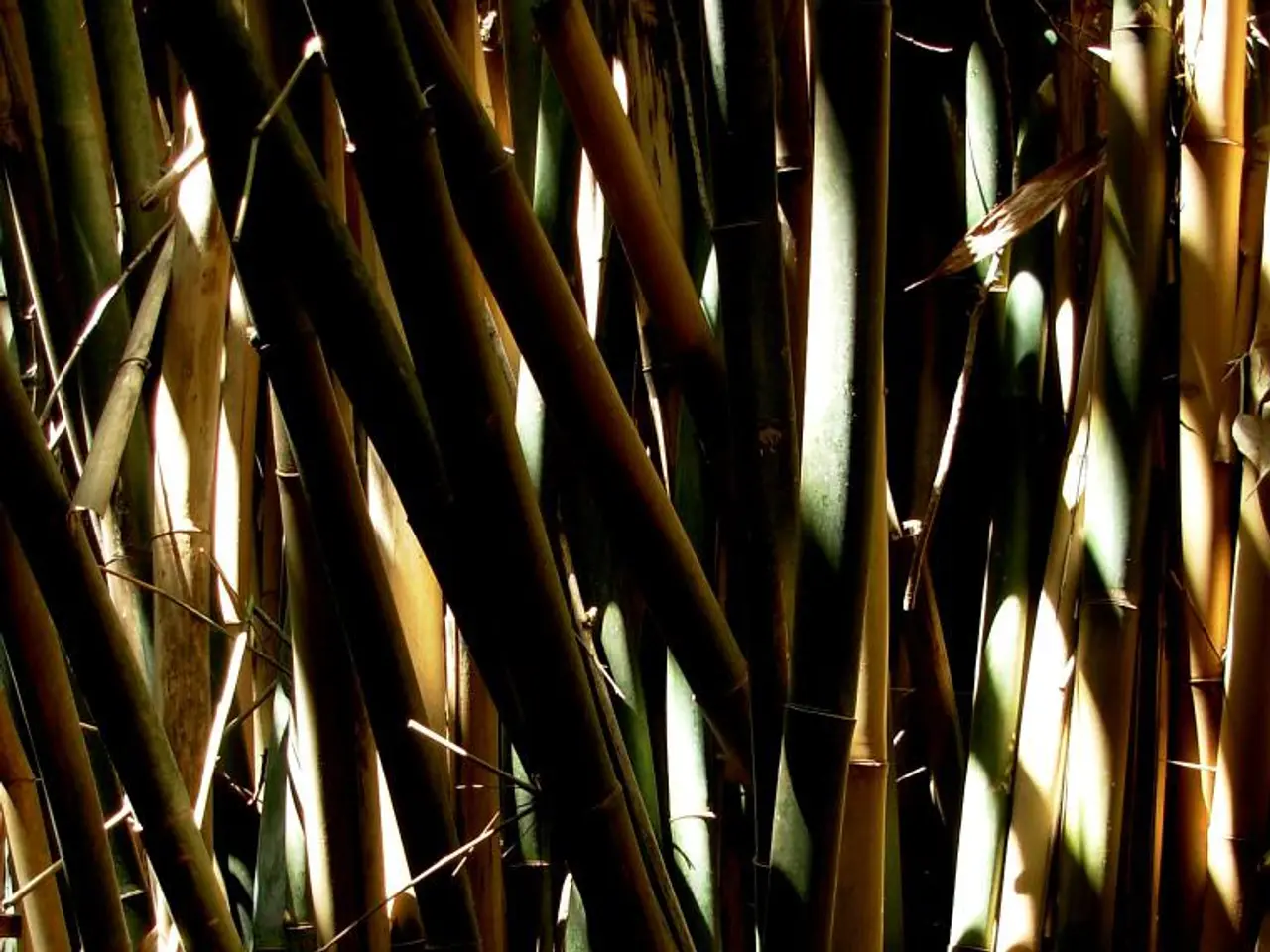Northeast India's Hidden Gems: Savoring the Fermented Bamboo Shoot Delicacies of Bastenga and Kesei
In the lush, verdant landscapes of Northeast India, a renewable resource is thriving - bamboo. This fast-growing grass, sometimes growing up to a meter in a single day, is not just a natural wonder but also a boon for local communities.
Bamboo, a permanent and evergreen plant, belongs to the Poaceae family. It is more than just a building material; its edible shoots are a rich source of dietary fiber, proteins, minerals, vitamins, and essential minerals. They are low in fat and calories, making them an ideal food for those conscious about their health.
The traditional processing methods of bamboo shoots in Northeast India are a testament to the region's food preservation ingenuity and cultural roots. These methods include fermentation, drying, smoking, and pickling. The most common traditional products are Bastenga and Kesei. Bastenga is made from fermented, sun-dried, smoked, and curled bamboo shoots, while Kesei is the preserved juice obtained during the fermentation of bamboo shoots.
These processing methods not only enhance the shelf life of bamboo shoots but also develop strong umami flavors and probiotics, contributing to both taste and nutritional benefits. The fermentation process, in particular, adds health-promoting benefits by increasing digestibility and introducing beneficial microorganisms.
The traditional bamboo shoot products of Northeast India are gaining renewed attention due to increased interest in indigenous, health-conscious, and fermented foods. The region's bamboo shoots are sustainable and renewable due to rapid bamboo growth and low input farming. Shelf-stable products like fermented bamboo shoots and pickles are being commercialized more readily, with products now available in regional and urban markets, expanding rural farmers’ income opportunities.
The uniqueness of regional flavor profiles and cultural appeal adds value for niche and export markets. Awareness about the health benefits and unique taste of these fermented bamboo shoot products is growing, offering potential for expansion into wider markets.
By preserving indigenous recipes, farmers are also safeguarding cultural heritage for future generations. Local communities have traditionally relied on bamboo shoots as a seasonal delicacy and source of nutrition. Bamboo shoots and Kesei have been used in traditional medicine to treat stomach ailments, improve appetite, and promote overall vitality.
The art of making Bastenga and Kesei represents a beautiful blend of nature, tradition, and farming skill. Farmers can collaborate through cooperatives to ensure consistent quality, proper packaging, and adherence to food safety standards. Sustainable harvesting practices are important to ensure future growth of the bamboo clump.
The growing popularity of fermented foods worldwide has created new market opportunities for bamboo shoot farmers in Northeast India. Farmers who engage in bamboo shoot processing can add value to their harvest, increasing their income without needing large-scale infrastructure. Bamboo grows abundantly in the rain-fed landscapes of Northeast India as part of the natural ecosystem.
In summary, Northeast India's traditional bamboo shoot products feature diverse, artisanal processing methods that preserve nutritional and probiotic qualities while embodying cultural identity. Their sustainable cultivation and rising demand in specialty food markets indicate promising economic potential for rural communities.
- Beyond being a building material, bamboo shoots are also a rich source of dietary fiber, proteins, minerals, vitamins, and essential minerals, making them an ideal food for health-conscious individuals.
- The traditionalprocessing methods in Northeast India for bamboo shoots, such as fermentation, drying, smoking, and pickling, enhance shelf life, develop strong umami flavors, and contribute to nutritional benefits.
- The growing interest in indigenous, health-conscious, and fermented foods, along with the sustainability and renewable nature of bamboo shoots, have led to commercialization efforts, making these products available in regional and urban markets.
- The regional flavor profiles and cultural appeal of bamboo shoot products offer value for niche and export markets, while the awareness about their health benefits and unique taste grows, leading to potential expansion into wider markets.
- Sustainable harvesting practices, proper packaging, and adherence to food safety standards can ensure the continued growth of bamboo shoots and the income opportunities they provide for rural farmers, who are preserving their cultural heritage through indigenous recipes.




